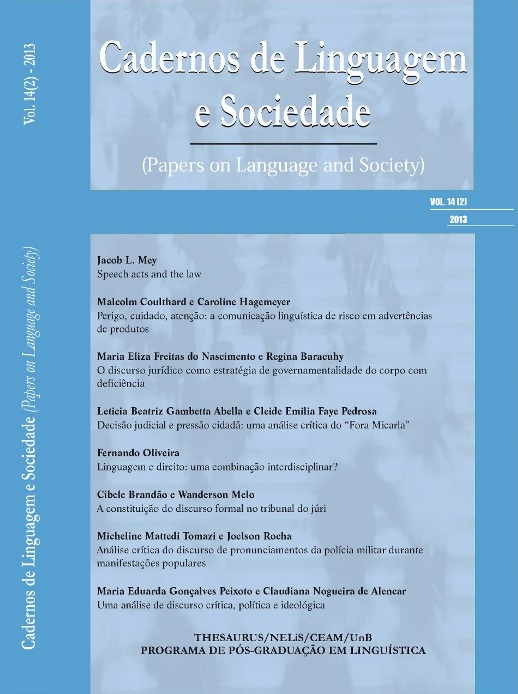Text organization of formal or oral and written discourse: an analysis based on the work of Borges
DOI :
https://doi.org/10.26512/les.v14i2.9223Mots-clés :
Systemic Functional Linguistics, textual organization, oral and written discourse.Résumé
This study examines the text organization of formal oral and written discourse using Systemic Functional Linguistics (SFL), where Theme is considered the point of departure of the message (Halliday 1994, Halliday y Matthiessen 2004). In SFL the succession of Themes as a text unfolds constitutes its ‘method of development’ (Fries 1983/1995), which is the ‘scaffolding’ (Stainton 1993) needed for introducing rhematic contributions. Recent work in SFL has suggested that oral English tends towards more ‘contentlight’ and written English towards more ‘contentful’ methods of development (Berry forthcoming a & b). A detailed comparative analysis of the different choices in Theme and grammatical metaphor in thematic position is developed for Spanish, based on conferences by Borges and research articles on his work. Results support the hypothesis that oral discourse, even if it is formal, uses contentlight Themes with interpersonal metaphors whose function is to manifest authorial presence. In contrast written discourse uses contentful Themes with experiential metaphors whose function is to construct highly nominalized methods of development that reduce authorial presence by focusing on abstract entities.
Téléchargements
Références
BERRY, M. Towards a study of the differences between formal written English and informal spoken English. In Lise Fontaine, Thomas Bartlett and Gerard O’Grady (eds.) Systemic Functional Linguistics: Exploring Choice. Cambridge: Cambridge University Press, forthcoming.
BERRY, M. Contentful and contentlight Subject Themes in informal spoken English and formal written English. In Gerard O’Grady, Lise Fontaine and Thomas Bartlett (eds.) Choice in Language. London: Equinox, forthcoming.
DAVIES, F. Reading between the lines: Thematic choice as a device for presenting written viewpoint in academic discourse. ESPecialist, Vol. 9, Nos 1/2. 173-200, 1988.
EGGINS, S. An Introduction to Systemic Functional Linguistics. London:
Pinter Publishers, 2004.
FIRBAS, J. Functional sentence perspective in written and spoken communication Cambridge: Cambridge University Press, 1992.
FRIES, P. On the Status of Theme in English: Arguments for Discourse. In Pertofi J.S. and Sozer E. Micro and Macro Connexity of Texts: Papers in Text Linguistics. Hamburg: Helmut Burk, 1983.
FRIES, P. Themes, Methods of Development, and Texts. In Hasan R. and Fries P. (eds.) On Subject and Theme: A Discourse Functional Perspective. Amsterdam: John Benjamins, 1995.
HALLIDAY, M.A.K. Spoken and Written Language. Oxford: Oxford University Press, 1989.
HALLIDAY, M.A.K. An Introduction to Functional Grammar. London: Edward Arnold, 1994.
HALLIDAY, M.A.K. and MATTHIESSEN, C.M.I.M. An Introduction to Functional Grammar. London: Edward Arnold, 2004.
MARTIN, J.R. Factual writing: exploring and challenging social reality. Oxford: Oxford University Press, 1985.
MARTIN, J.R. English Text: System and Structure. Amsterdam: John Benjamins, 1992.
MARTIN, J.R. and ROSE D. Genre Relations. Mapping Culture. London: Equinox, 2008.
TABOADA, M.T. Building Coherence and Cohesion: Task-oriented dialogue in English and Spanish Amsterdam: John Benjamins, 1995.
STAINTON, C. Metadiscourse and the Analytical Text: a Genre-based Approach to Children’s Written Discourse. Unpublished PhD Thesis. Manchester : University of Manchester, 1993.
WEIL, H. De l’ordre des mots dans les langues anciennes comparées aux langues modernes Paris: Librairie A. Franck, 1844.
Corpus
BORGES, J.L. Borges Oral. In Obras Completas, Tomo IV. Buenos Aires: Emecé Editores, 1979, p. 163-179.
RIVAS CASASAYAS, A. Signos Mágicos y de lo Absoluto: Aproximación a Términos y Conceptos de Filosofía del Lenguaje en Tres Cuentos de Jorge Luis Borges. Neophilologus, Vol 84, Nº 4: 555-575, 2000. Originally published in Signa 8, 1999.
Téléchargements
Publié-e
Comment citer
Numéro
Rubrique
Licence
Autores/as que publicam nesta revista concordam com os seguintes termos:
Autores/as mantêm os direitos autorais e concedem à revista o direito de primeira publicação, sendo o trabalho simultaneamente licenciado sob a https://creativecommons.org/licenses/by-nc-nd/4.0/o que permite o compartilhamento do trabalho com reconhecimento da autoria do trabalho e publicação inicial nesta revista.



